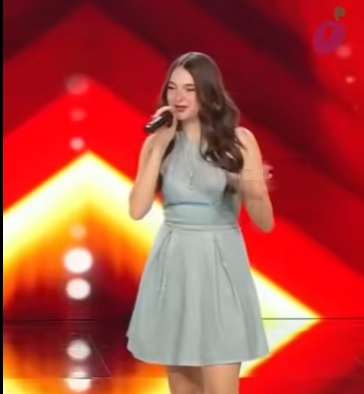The auditorium buzzed with restless energy. Lights shimmered across the stage, bouncing off the deep crimson curtains and casting a warm glow across hundreds of eager faces. Judges sat in their tall chairs, pens in hand, ready to scribble their notes. Camera crews adjusted their lenses, ensuring every angle would be captured. It was the kind of night where dreams were either made or quietly shattered.
Backstage, Emily Harper stood frozen in her silver dress, clutching the microphone as though it might fly away if she loosened her grip. Sixteen years old, her long brown hair curled gently at the ends, cascading over her shoulders. To the casual observer, she looked like any other contestant waiting for her moment. But inside, Emily was fighting a war no one could see.
Emily had autism, and though her diagnosis often brought misunderstanding from others, she had long since realized it was also part of what made her unique. The world was loud, unpredictable, and often confusing, yet within the chaos she had discovered one constant: music.
From the time she was small, Emily had hidden in her room with a set of headphones, mimicking the voices she heard. Singing became her anchor, her way of organizing feelings she couldn’t always explain in words. When others dismissed her as shy or odd, her voice spoke louder than any explanation she could give.
But tonight was different. Tonight she wasn’t singing alone in her bedroom. She was standing before a crowd of thousands in the theater, and millions more who would be watching from their living rooms.
The stage manager whispered, “You’re up,” and gently nudged her toward the blinding lights. Emily’s knees trembled. Her mind screamed a familiar mantra: It’s too much, too loud, too many eyes. But then another thought broke through the panic: You’ve come this far. Sing.
Taking a shaky breath, she stepped into the spotlight. The crowd hushed, curious about the girl in the silver dress.
“Tell us your name,” one of the judges said, his voice kind but professional.
“Emily Harper,” she whispered into the microphone.
“And how old are you, Emily?”
“Sixteen.”
The judge smiled. “And what will you be doing for us tonight?”
Emily swallowed hard. “I’ll be… I’ll be singing a song I wrote myself.”
A ripple of surprise passed through the audience. Singing was one thing; writing an original song was another. The judges leaned forward, intrigued.
The music began softly, a simple piano melody. Emily closed her eyes. For a heartbeat, fear threatened to crush her voice. But then she remembered her mother’s words from earlier that morning: “The stage isn’t your enemy, sweetheart. It’s your canvas. Paint with your song.”
And so she did.
Her voice rose, clear and trembling at first, then stronger with each note. The lyrics spoke of feeling invisible, of walking through crowded halls where no one seemed to understand. Yet woven into the song was hope—hope that one day she would be seen for who she truly was, not just the label others gave her.
The room grew silent. The usual whispers and coughs vanished. Even the judges seemed suspended in stillness, their pens forgotten. Emily’s voice soared into the chorus, her words echoing like a promise:
“I am more than what you see,
More than whispers chasing me,
In the silence, hear my plea,
I am finally free.”
By the second verse, something magical had happened. The audience leaned forward, some with tears glistening in their eyes. Emily wasn’t just singing; she was sharing her world with them, inviting them into a place where vulnerability and courage met.
As the final note lingered in the air, the theater erupted. Applause thundered like a storm, rising higher and higher until Emily felt the vibration in her chest. People leapt to their feet, clapping, cheering, some even shouting her name.
Emily opened her eyes, startled. She had braced herself for polite claps at best, perhaps even indifference. But this—this tidal wave of love and recognition—was overwhelming. Her chest tightened, and for a moment she wasn’t sure whether to cry or laugh.
One of the judges wiped her eyes before speaking. “Emily, what you just did… it was extraordinary. You have a gift, but more importantly, you have a story that touched every single person in this room.”
Another leaned forward. “You didn’t just sing. You reminded us why we listen to music in the first place—to feel something real. Thank you.”
Emily stood speechless, her microphone trembling in her hands. For once, words didn’t fail her because they weren’t needed. The applause said everything.
Backstage, her mother waited with arms open wide. Emily rushed into them, burying her face in her mother’s shoulder. “They liked it,” she whispered in disbelief.
Her mother kissed the top of her head. “They didn’t just like it, Emily. They believed in you.”
From that night forward, Emily’s life began to change. She wasn’t just the quiet girl at school anymore, the one people overlooked. She became the girl whose song had made strangers cry, whose voice had silenced a crowded room.
But more than the fame or the applause, what mattered most to Emily was something simpler: for the first time, she felt truly seen.
Because on that stage, in her silver dress, she hadn’t just sung a song. She had told the world, “This is me.” And the world had finally listened.
